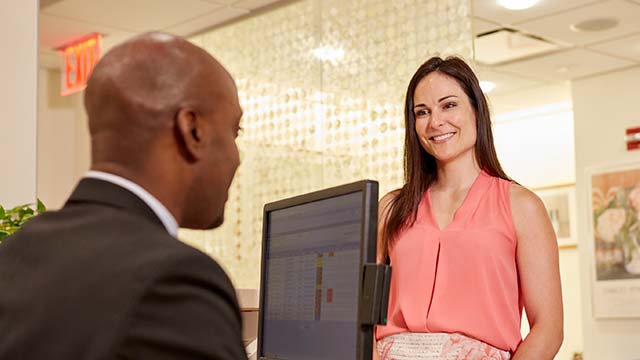
Oncofertility Services
Cancer treatment has become increasingly advanced over the years, and medical science can do much to improve survival and quality of life. However, that may come with costs. Some treatments, especially chemotherapy and radiation therapy, can decrease a woman’s chances of becoming pregnant. If you are facing a cancer diagnosis, you may worry about your ability to start or build a family in the future. If you have a family history of cancer or are at a higher risk of developing certain types of cancer, you may also have concerns. At The Blavatnik Family Chelsea Medical Center at Mount Sinai, we can help guide you to oncofertility services.
We recommend that you discuss your concerns with your doctor before starting treatment. Your doctor may send you to a reproductive endocrinologist, who will work with you and your cancer treatment team to help schedule fertility treatments around your cancer treatment.
Treatment Options
Treatment options include egg freezing and embryo freezing, also known as vitrification.
Both approaches start with hormone medication injections over 8 to 12 days. This stimulates your ovaries to produce multiple eggs. The more eggs you have, the better your chances of success. Once the eggs are mature, a needle guided by ultrasound is used to collect them from the ovaries (this is called harvesting).
Egg freezing: With this approach, eggs are flash frozen with liquid nitrogen. This brings all activity to a standstill, essentially freezing them in time so they stay young and healthy even as you get older. Eggs can be stored for years. Then, when you are ready, the eggs are thawed and fertilized with sperm (from your partner or a sperm bank), creating an embryo. The embryo is implanted in your womb, or the womb of another woman (called a surrogate). From this point, the pregnancy proceeds as usual.
Embryo freezing: Embryos are fertilized eggs. With this approach, harvested eggs are fertilized with sperm using in vitro fertilization (IVF). This means that the eggs and sperm sample are combined in a laboratory dish using a high-powered microscope. The eggs—now called fertilized zygotes—grow for a few days, becoming embryos. By the third day, the number of healthy embryos is apparent. They are frozen at that point to keep the embryos young and healthy.
Both freezing eggs and freezing embryos are highly effective. And they give you the reassurance to know that after cancer treatment, you can have your own biological child.